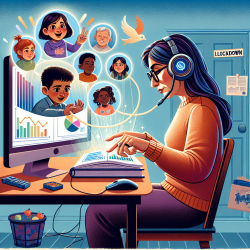Introduction
In the ever-evolving landscape of online therapy services, particularly for children, it is crucial to leverage data-driven insights to enhance therapeutic outcomes. The recent research article, "Who should feed hungry families during crisis? Moral claims about hunger on Twitter during the COVID-19 pandemic," provides a unique perspective on how social media discourse can influence public opinion and policy. This blog explores how practitioners can apply these insights to improve their online therapy services, particularly in the context of speech language pathology.
Understanding the Research
The research conducted by Oleschuk (2022) analyzed over 1,000 Twitter posts related to hunger during the early months of the COVID-19 pandemic. The study revealed that social media users primarily framed hunger as a political issue, making moral claims on the state to address food insecurity. This discourse analysis highlights the potential of social media as a tool for understanding public sentiment and mobilizing action.
Implications for Online Therapy Practitioners
For practitioners in speech language pathology, the findings of this research offer several key takeaways:
- Data-Driven Insights: Just as social media data can reveal public sentiment on issues like hunger, similar analyses can be applied to understand the needs and challenges faced by children in online therapy settings. Practitioners should consider utilizing social media and other digital platforms to gather insights into the experiences and expectations of their clients.
- Advocacy and Policy Influence: The study underscores the power of social media in shaping public discourse and influencing policy. Online therapy practitioners can leverage these platforms to advocate for policies that support better access to therapy services for children, especially in underserved communities.
- Community Engagement: Engaging with communities on social media can help practitioners build stronger relationships with clients and their families. By participating in online discussions and sharing valuable resources, practitioners can enhance their visibility and credibility.
Encouraging Further Research
While the research provides valuable insights, it also highlights the need for further exploration. Practitioners are encouraged to conduct their own research to better understand the unique challenges and opportunities within their specific contexts. This could involve analyzing social media trends related to speech language pathology or conducting surveys to gather direct feedback from clients and their families.
Conclusion
The intersection of social media discourse and online therapy offers exciting possibilities for enhancing therapeutic outcomes for children. By adopting a data-driven approach and actively engaging with digital platforms, practitioners can better understand and address the needs of their clients. As we continue to navigate the challenges of the COVID-19 pandemic and beyond, these insights will be invaluable in shaping the future of online therapy services.
To read the original research paper, please follow this link: Who should feed hungry families during crisis? Moral claims about hunger on Twitter during the COVID-19 pandemic.










